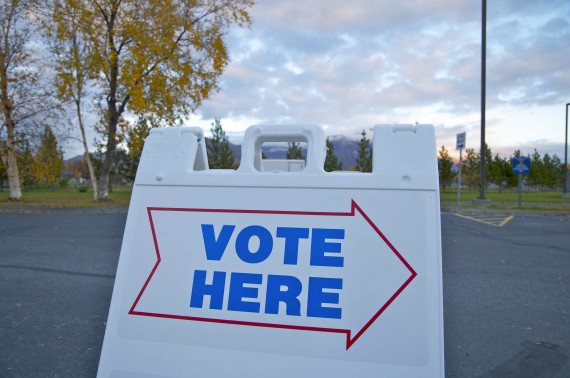Should We Let 16 And 17 Year Olds Vote?
After success in Scotland, it may be time to consider allowing at least some teenagers to vote.
Although it didn’t get much attention that I noticed here in the United States is the fact that, for what I believe is the first time in British history, people under the age of eighteen were permitted to vote on the independence referendum:
Scotland’s referendum on whether to break away from Britain is making history in more than one way: It has been the first time 16- and 17-year-olds in the U.K. have been able to cast a ballot.
Scotland lowered the voting age from 18 to 16 for the referendum. Though the new teenage voters are a relatively small part of the voting population, the move has given them rare political power.
When the change in voting age was announced, it was seen as a likely boost for independence, given the conventional view that younger voters tend to have less affinity for the status quo. But polls suggested that might not be the case.
Election officials say that more than 100,000 16- and 17-year-olds are registered to vote, out of 4.29 million total voters.
Pollsters say it has been difficult to accurately gauge teenagers’ voting intentions in their normal polling because relatively few of them were surveyed. A Thursday poll of more than 3,000 voters published by YouGov showed the youngest cohort was evenly split between voting for and against independence. The sample of voters, though, ranged from 16-year-olds to those aged 24.
A survey of more than 1,000 teenagers published by University of Edinburgh researchers in June found that those under 18 favored maintaining the union by 52% to 30%.
Yet like many other polls, the researchers also found a big portion of those interviewed hadn’t made up their minds. Walking alongside Mr. McMillan and dressed in the same uniform, Paul Feeney, 17, said he was unsure until the last minute, then decided “yes.”
“I tried to stay undecided for a while, and then just today sort of decided on it. So quite nervous for it, but excited,” he said.
Since there was no exit polling conducted in connection with the referendum, it’s unclear how many of the teenagers who were eligible and registered to vote actually participated. However, given the massively high turnout that the vote generated and the attention that the vote was getting in the media in the United Kingdom in general and Scotland in particular, it’s quite probable that the turnout among this voting cohort was roughly comparable to the population as a whole. Despite the lack of exit polling, though, and based in large part on the polling noted above, there has been some speculation that these teenagers may very well have played a significant role in helping the referendum fail, although the margin of victory that ‘No’ had on Thursday makes it obvious that there was more than just teenagers involved in saving the United Kingdom. For the most part, though, it appears as though the decision to open up the vote to teenagers was successful in that it increased the number of voices taking part in the election and seemed to do a pretty good job of raising civic awareness among an age group that usually doesn’t pay close attention to such issues. The more interesting thing about the experiment, of course, was the fact that these young Scottish voters were just as divided as the issue of independence as the rest of Scotland. Quite obviously, First Minister Salmond hoped that opening up the vote to teenagers would benefit the independence side of the debate, but if anything it appears that these voters may have been more favorable to the union, albeit by roughly the same margin as the rest of the country.
As it turns out, the idea of letting people under eighteen vote isn’t entirely new. As Bloomberg’s Francis Berry notes, 16 and 17 year olds are already permitted to vote in national elections in nations such as Argentina, Brazil, Ecuador, Nicaragua, the British islands of Gurensey, Isle of Man, and Jersey, and, as of 2007, Austria. Here in the United States, the city of Takoma Park in Maryland passed a law last year allowing teenagers to vote in municipal elections, and there is some talk of the same thing happening in other American cities. At least, in Austria, there appears to be some evidence that the extension of the franchise to teenagers has been successful in that turnout among this age group has actually been higher than among 18-21 year olds. There are similar results in Denmark, where 16 and 17 year olds are permitted to vote in local elections. The interesting question, of course, will be whether these newly enfranchised Austrian teenagers will carry that voting behavior into their late teens and early 20s, which seems to be an age group that tends to stay home on Election Day regardless of which country you live in.
Scotland’s decision to let teenagers vote in the referendum, though, has perhaps inevitably led to a discussion about whether full voting rights should be extended to teenagers, both in the United Kingdom and the United States. Georgetown University Professor Jason Brennan, for example, argues that the success of the Scottish referendum is strong reason for the U.S. to consider extending the franchise to younger voters:
Many here might be skeptical about the idea of the United States following Scotland’s lead in lowering the voting age. The trouble is that the main reason most people cite for barring 16- and 17-year-olds from voting looks like an equally good reason to stop most American adults from voting, too.
The key argument against letting high school juniors vote is simple: Their choice would affect all of us. After all, a voter chooses for everyone, not just him or herself. Many worry that most 16-year-olds lack the wisdom or knowledge to cast smart votes, so we don’t let them vote because we want to protect ourselves from their decisions.
And this concern is often grounded in reality — young adults are indeed in many cases profoundly ignorant about politics. But if that is a reason for excluding them from voting, it is surely a reason to exclude almost everyone else.
Every two years, for 60 years, the American National Election Studies has surveyed what prospective voters know and don’t know. And the results are always depressing — the top quartile of voters are like B students, tending to get about 85% of questions right. The next two quartiles do little better or worse than chance. But the lowest quartile are systematically misinformed. Indeed, if you ask them which party, Republicans or Democrats, is more conservative, most of them even get that answer wrong.
(…)
So, this is the catch: If you wanted to exclude 16- and 17-year-olds on the grounds that they are more likely to be ignorant or misinformed, you would also in effect be arguing against other demographics having a say.
Brennan argues that, perhaps, the solution to the “knowledge problem” would be to allow 16 or 17 year olds to vote if they are able to pass the citizenship test given to immigrants seeking to become citizens. Since that it is fair test that would seem to be free from the objections regarding discrimination that have plagued voter tests in the past, perhaps that would be something that could work. However, as Ilya Somin noted when he wrote about this issue many years ago, it may be difficult if not impossible to create the incentives for local voting authorities that would lead them to create fair and neutral voter tests that wouldn’t be motivated by the desire to suppress voters who might vote for one party or the other, or minorities. That being said, assuming such a test can be created and fairly implemented, I have to agree with Somin that there doesn’t seem to be any reason why a teenager who is objectively more knowledgeable about government and politics than many adults should not be permitted to vote in elections that, without question, are going to have a profound impact on their future. Indeed, if it results in greater voter participation as has apparently been recorded in Austria and Denmark, then it would be a good thing for the country overall.
Outside of the actions in Takoma Park, there is no real national movement in the United States t0 extend the franchise to anyone under 18. This is a stark contrast to the movement that led to the ratification of the 26th Amendment in less than three months in 1971, when the arguments about extending the franchise to 18-21 year olds was rooted in no small part in the fact that these men were being drafted to fight in Vietnam but were not allowed to vote. There really aren’t any similar arguments regarding the urgency of extending the franchise to 16 and 17 year olds, most of whom remain in school and under their parents care and supervision. While it’s true that this potential voting cohort will be profoundly impacted by the decisions made by politicians elected before they are eligible to vote, there does’t seem to be the same sense of urgency. Indeed, beyond the knowledge issue dealt with above, the fact that these potential voters don’t really have anything other than an abstract stake in society at this point in their lives is another argument against extending the franchise to them. That being said, the seemingly successful experiences of nations like Austria and Denmark, along with the decision to extend the franchise in Scotland for the limited purpose of the independence referendum, argues that it is at least an idea that ought to be considered even if we don’t rush headlong into signing up High School Seniors and Juniors to vote.







We will never have voting tests in the United States, for obvious reasons. But we should. Everyone should have to pass the citizenship test in order to vote.
Age-based criteria are inherently ridiculous. It’s what we use, but of course it makes no sense. The problem as Doug points out is that the obvious alternative is to test knowledge, and that would likely disenfranchise much of the south. (Yes, that is snark.)
Or we could abandon them on an isolated island in a remote region of the Pacific Ocean.
http://mmimageslarge.moviemail-online.co.uk/8573_Lord-of-the-Flies-03.JPG
@Pinky: i doubt most citizens could pass the citizenship test. I also don’t see how knowing what’s on that test helps you choose between two candidates or tells what to expect from someone once he’s elected to office.
How about the candidates have to pass a Constitution Test before they run for office?
Then maybe old Huckleberry would understand that we have elections in this country instead of forced indoctrination.
I think I’ve mentioned this once before, but one way to solve the problem of low-information voters mucking up the political process without actually disenfranchising anyone would be to pay voters to pass voluntary citizenship tests. Each election period, a state government could offer an exam about the basic structure of the political system, including checks and balances, how a bill becomes law, which party is currently in control of each office, who your own representatives are, maybe some objective background facts about the candidates and some issues, (this category of questions would have to created by some nonpartisan board, and drawn randomly from a question bank for each test taker) etc. If you pass, you get money, say a few hundred dollars. If you fail, nothing happens. You get unlimited tries, but you are limited to one payment per election. There’s no obligation to take the test, and nothing happens to your voting rights if you can’t pass it, so it doesn’t disenfranchise anybody. It just incentivizes voters to get engaged with the political process, and in particular, should boost political engagement (and by extension, turnout) among poor voters, who will be most interested in taking the test.
Yeah. Great idea! We could call it Grade School Civics Class…
In order to be consonant with current conservative thinking that life begins when the sperm fertilized the egg, perhaps voting right should be extended to the unborn?
Seriously, I hesitate to compare a 16 year old in Scotland with a 16 year old here. Then again, so called ‘mature’ voters elect people like Louie Gohmert or Allen West, so ….
@al-Ameda:
Scottish kids are very smart. I know this because I sell better in Scotland (UK, Ireland and Oz as well) than I do in the US. An obvious marker of intelligence.
@ beth
It doesn’t but it could prove to be a useful tool for voter suppression, a key goal of the right.
Or we could figure out how to get them to stop watching Fox News…
@TheoNott: There’s no way you could convince people to take it. They’d assume it was a slippery slope to voter suppression.
“Indeed, if you ask them which party, Republicans or Democrats, is more conservative, most of them even get that answer wrong.”
See, this is the problem with testing. If you ask this question of a person who knows what “conservative” means, they’ll get it wrong.
There needs to be a test for every voter:
Who was the NASCAR champion 2012?
Why should be go back to the Gold standard?
Why is property theft?
If you can answer any of these questions you don’t get to vote.
We have a so-called ‘civic religion’ based on the concept of representative democracy and various ‘holy’ texts such as the Declaration, the Preamble, Lincoln’s Second Inaugural and maybe a few others. But we have no civic ‘sacraments’ that bind ourselves together as a living political organism.There is no ‘confirmation’ or ‘first communion’. It’s free to be an American; one is asked to do nothing.
I’ve thought for years that a senior year level high school course should be based on local elections that the students who pass experience something close to the ceremony of naturalization and then actually go to their precinct to stand in line and cast their first vote.
H@ll of a lot more meaningful a ‘passage’ than getting your drivers license or first credit card.
“After success in Scotlan”
Uh… how are you defining success?
Stick to 18 as the voting age and lower the drinking age to the same.
That way you can vote and then get drunk once you realize that you helped get a schmuck elected.
As for citizenship tests, people would assume it’s a slippery slope towards voter suppression because the slope would have already reached bottom. It is voter suppression.
@Rodney Dill:
I’d say an 86% turnout is a success regardless of the outcome.
Hell no!!!
I bet their balloting speed and trust in the count encourages voting.
@michael reynolds:
Well, the actual idea Brennan proposes isn’t to test everyone, just 16 and 17 years old. But, yes, as Somin admits in the article I linked, there are problems with the idea of voter tests,
@michael reynolds:
Age based criteria are inherently arbitrary, but not necessarily ridiculous. One could argue that 16 and 17 year olds are as qualified to vote as 18 and 19 year olds, but the line has to be drawn somewhere unless you advocate letting infants vote.
@JohnMcC:
Getting a driver’s license, High school graduation. voting, signing up for selective service, first legal drink
@Grewgills:
Well setting aside infants, you’d agree I assume that there exist ten year-olds who are smarter, wiser and more knowledgeable than any number of adults. And given that the kid has a much greater interest in the future than, say, me at age 60, relying solely on age is not rational. Practical maybe but not rational.
I voted when I was 17 years old. I don´t think that my vote at that time was considerably worse than any later vote that I took. Adult voters are not sages, most voters are usually driven by emotion, political strategists are aware of that.
Besides that, in the United States elections are held in the middle of the week, there is no public holiday for elections, so, increasing voting among younger people can avoid gerentocracy.
(Yes, at least here in Brazil turnout among 16 and 17 years old is absurdly abysmal).
@Michael Reynolds:
They may exist, but they are not the norm. Relying solely on age is not irrational given the alternatives. Choosing where to draw the line is arbitrary, but if we accept that there is some age at which people are not competent to make that decision means that a line should exist.
No one posted this yet? Hard to believe:
https://www.youtube.com/watch?v=hSDxg-bDw1A
@Mu: Shouldn’t question three be “why is taxation property theft?”
@Rodney Dill: In this case, high voter participation (apparently even among young voters) and a sane outcome.
@rudderpedals: Yes, but Scotland has more homogenity, so despite the flaming about being half-breeds and such in blog posts that I read, it’s not like they’re permitting creatures who aren’t even human to vote like we do here.
if anything they should raise it to 21, irresponsible kids voting for a tv icon is no way to run a country.
@michael reynolds: you mean those people who need “help” voting? i thought they were democrats?
@Davebo: The ‘success’ I was referring was from the excerpt on the front page of OTB, (Which apparently wasn’t actually excerpted from the post). How do you measure the 16-17 year old participation as a success? Just high turn out? Just following the way their parent or friend voted? How do you measure that they are providing a reasoned decision and not being unduly influenced? Though the article does point out this may be a valid question for voters of all ages. I don’t have a definitive belief either way at this point, I just wanted to know what the measure of ‘success’ was that was being used.
I can’t see how this would never happen in the US as it wouldn’t in any way advantage the GOP, and they’re already all to eager to disenfranchise voters they see as more likely to support their opponents.
First thought that jumps out about knowledge tests- why should voters have to prove themselves knowledgable when politicians don’t?
Apparently you can even run as a candidate for Vice President with little to no knowledge of the world, the government or the constitution.
There is an implicit argument above that the right to vote should be based on knowledge (defined as ability to take a test) rather than on judgement. What are the proper criteria for the right to vote?
@Dave Schuler: Sound judgment is based on knowledge. Judgment without knowledge is guesswork.
One of things we did in Government class when I was a Senior was toward the end of the school year, everyone who was 18 took a trip to the county courthouse that was 3 blocks from the high school and registered to vote.
I’d be in favor of lowering the voting age, of course it will never happen because Republicans are against any measure that adds more people to the active voting rolls.
In answer to Doug’s question, a succinct answer would be no. At 16 or 17, my daughter would have voted for the candidate she thought was best looking and my son would have voted for the one he thought was coolest.
Thank God they’ve matured since then. A bit. 🙂
The reason they let the kids vote was because the Scottish population is in decline. Old people are usually set in their way and they thought it would help with the succession vote.
@Grewgills: Thank you for the thoughts. Yes, I’d agree these are what I called ‘passages’ in the comment. (After Gail Sheehy’s book of many years ago.) But I contend these are not of — what to call it — ‘national’ or ‘political’ significance.
@Just ‘nutha’ ig’rant cracker: Hah! So much is in the eye of the beholder! As a confirmed old leftie, I saw “why is property theft” like this: “Why is (private) property the (necessary precondition to) theft?”
I was 18 in January of 1966. Still a Senior in HS.
All I could do was go to the Selective Service System in the Harvey IL Post Office and register for the draft.
Had to be 21 to vote the bastards out who made me do that.
Fuk the War! Fuk the Draft!
@bill: “if anything they should raise it to 21, irresponsible kids voting for a tv icon is no way to run a country.”
Yes, it was a shame that Ronald Reagan was elected because of his celebrity, but what are you gonna do?